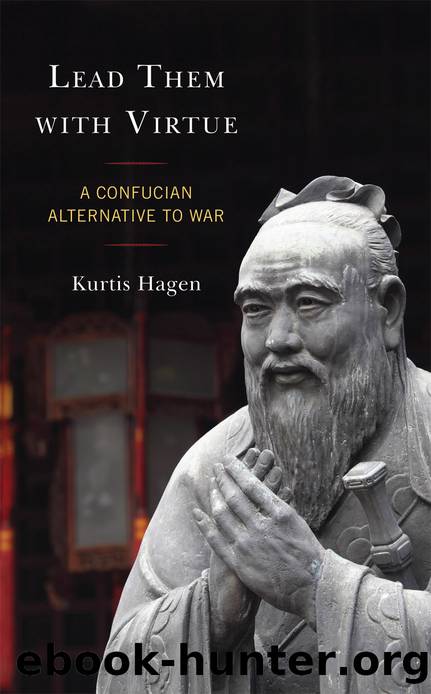Lead Them with Virtue by Kurtis Hagen

Author:Kurtis Hagen
Language: eng
Format: epub
Publisher: Lexington Books
Published: 2021-08-07T00:00:00+00:00
NOTES
1. Similarly, Yang Qianru writes, âEven though Mencius says that there were no just wars in the Spring and Autumn Period, he still holds that undertaking war to preserve dying states, to ensure succession for those without an heir, to remove tyranny, and to stop slaughter is rightâ (Yang 2011, pp. 150â151). Yang simply asserts this without citation or further discussion. Are we to believe that none of these conditions occurred during the Spring and Autumn Periodâa turbulent three hundred years? (See Mencius 7B2.) And further, it would be odd for Mencius to be so open to various possible wars if it is true that, as Cao Qin suggests, âvirtually none of the wars that happened in his lifetime could have counted as justâ (Qin 2020, p. 169).
2. David Kratz Mathies, for example, argues for a position similar to mine. His conclusion is quoted in the previous chapter (p. 48). Also, Yan Xuetong cites a book by Liang Qichao, published in 1922, as arguing that Mencius was a pacifist (Yan 2011, pp. 21-22). In addition, John Ferguson makes the following intriguing claim, which Mathies alerted me to: â[Confucius] did not challenge war; he refined it, but that refinement itself proved a challenge. For a check on unrestricted war proved to be a check on warâ (Ferguson 1978, p. 64). Unfortunately, Ferguson does not elaborate.
3. Yan cites Huang 1996, p. 76.
4. Here I have used the quotation as it appears in Yan 2011, p. 35.
5. The Spring and Autumn Period was 771â476 BCE, or on other interpretations, running until 403 BCE. Mencius lived 372â289 BCE.
6. Bai also stresses both aspects of this criterion, which seems to serve as the key justification for humanitarian intervention (see Bai pp. 50â51). I leave out the âlong-lasting welcomeâ condition in the analysis below because it has limited usefulness at the time intervention is being contemplated, which is my focus. It can be useful, however, in retrospective assessments.
7. It is not perfectly clear whether Bell means that (a) punitive expeditions âmust [only] be launchedâ by potentially virtuous rulers, or, (b) so long as the other conditions are met, potentially virtuous rulers must (i.e., are morally obligated to) engage in humanitarian interventions. I take Bell to mean the former. But Sumner Twiss and Jonathan Chan explicitly maintain that, for Mencius and Xunzi, morally qualified rulers have a âduty to rectify a severely tyrannical situationâ (Twiss and Chan 2015b, p. 131; see p. 93, below).
8. The passage cited reads as follows: âNow the Prince of Yan cruelly mistreated his own people and Your Majesty set out on a punitive expedition. Yanâs people thought you were saving them from âflood and fireâ [i.e., from tyranny]â (Mencius 1B11, as quoted in Bell 2008, p. 235).
9. For convenience in judging this claim, Iâve included Mencius 7B4 in its entirety here: Mencius said, âThere are some who say, âI excel at arranging battle arrays, and at warfare (zhan æ°).â This is a tremendous crime. A ruler of a state who is fond of ren ä» (benevolence/humanity) has no enemies (di æµ) in the world.
Download
This site does not store any files on its server. We only index and link to content provided by other sites. Please contact the content providers to delete copyright contents if any and email us, we'll remove relevant links or contents immediately.
The remains of the day by Kazuo Ishiguro(8955)
Tools of Titans by Timothy Ferriss(8350)
Giovanni's Room by James Baldwin(7305)
The Black Swan by Nassim Nicholas Taleb(7091)
Inner Engineering: A Yogi's Guide to Joy by Sadhguru(6778)
The Way of Zen by Alan W. Watts(6580)
Asking the Right Questions: A Guide to Critical Thinking by M. Neil Browne & Stuart M. Keeley(5743)
The Power of Now: A Guide to Spiritual Enlightenment by Eckhart Tolle(5734)
The Six Wives Of Henry VIII (WOMEN IN HISTORY) by Fraser Antonia(5490)
Astrophysics for People in a Hurry by Neil DeGrasse Tyson(5171)
Housekeeping by Marilynne Robinson(4425)
12 Rules for Life by Jordan B. Peterson(4293)
Double Down (Diary of a Wimpy Kid Book 11) by Jeff Kinney(4253)
The Ethical Slut by Janet W. Hardy(4234)
Skin in the Game by Nassim Nicholas Taleb(4225)
Ikigai by Héctor García & Francesc Miralles(4222)
The Art of Happiness by The Dalai Lama(4117)
Skin in the Game: Hidden Asymmetries in Daily Life by Nassim Nicholas Taleb(3980)
Walking by Henry David Thoreau(3941)
